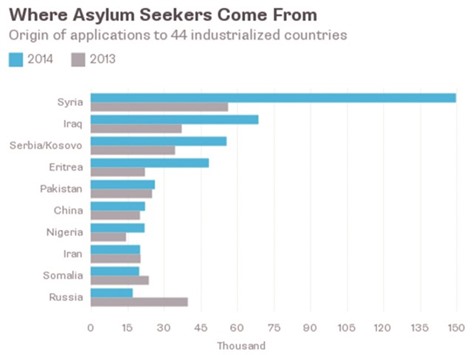Political asylum just might be the world’s most controversial universal idea. Most countries offer it. The UN declares it as an inalienable human right. In the wake of violence mostly in the Mideast, Afghanistan and parts of Africa, the number of people seeking asylum outside their own countries has risen to a record level. The discord starts when countries try to figure out who deserves sanctuary. The principle is that nations should protect victims of persecution elsewhere. The question is whether support for it can survive today’s flood of refugees and the subsequent swell of antipathy toward outsiders in some host countries.
The Situation
In his first week in office, US President Donald Trump issued an executive order indefinitely banning admission of people fleeing Syria, temporarily freezing the entry of other refugees and prohibiting entry by people from seven majority-Muslim countries for 90 days. Trump was elected after proposing at least a temporary “complete shutdown of Muslims entering the US.” In Europe, too, nationalist politicians have surged in polls and elections by questioning the wisdom of accepting refugees. Attacks in Europe and the US linked to Islamic State have engendered fear that future terrorists lurk among those seeking sanctuary. The number of individuals seeking asylum or refugee status in 2015 rose to 2.45mn, an increase of almost 50% from the year before. The largest numbers are from war-torn Syria. For the second time in two years, a Southeast Asian refugee crisis erupted in late 2016, as thousands of Rohingya, a Muslim ethnic group, fled religious persecution in Myanmar. Tens of thousands of Iraqis, including Christians, have found refuge in France and the US. One person’s refugee can be another’s wanted man. Think of Edward Snowden, the National Security Agency contractor who was granted asylum by Russia after revealing details of classified US government surveillance programmes, and Julian Assange, the founder of Wikileaks, who was given asylum in 2012 by the Ecuadorian Embassy in London after Sweden sought his extradition on rape allegations.
The Background
The Office of the UN High Commissioner for Refugees says the concept of asylum is one of the “earliest hallmarks of civilisation,” citing references to it in 3,500-year-old texts. The word comes from the ancient Greek term for freedom from seizure. The 1951 UN Convention relating to the status of refugees and its 1967 Protocol are the modern legal framework for asylum, defining refugees as people who can show they’ll be persecuted at home based on race, religion, nationality, political conviction or social group. In 2014, 626,500 asylum applications were accepted and 434,900 rejected. Asylum has been used as a political tool, as when Americans welcomed Cubans and Vietnamese seeking refuge from Communism. Individuals have used it to avoid or delay criminal prosecution. Examples include Snowden, Assange and Charles Taylor, the former Liberian president indicted for war crimes, who was given temporary refuge by Nigeria.
The Argument
More flight from violence means more polarised debate over asylum. Critics say asylum policy has grown too lax and threatens to supplant the regular immigration process. Trump argues that the US has insufficiently screened refugees to keep out potential terrorists. Defenders of the screening policy say it is rigorous, even if no system is foolproof. Asylum advocates stress the universal obligation to protect the vulnerable and note that many of the people Trump would keep out are fleeing the terrorism of Islamic State.
Some say asylum should be extended to people fleeing danger, not just those exposed to official persecution. They cite the unaccompanied children from Central America who streamed across the US-Mexico border in record numbers in 2014, running from gangs and some of the world’s highest murder rates. Critics of the US asylum judgments say they are so arbitrary they amount to “refugee roulette.” A cottage industry of sorts has grown to provide would-be haven seekers with compelling personal narratives that are exaggerated or false.

